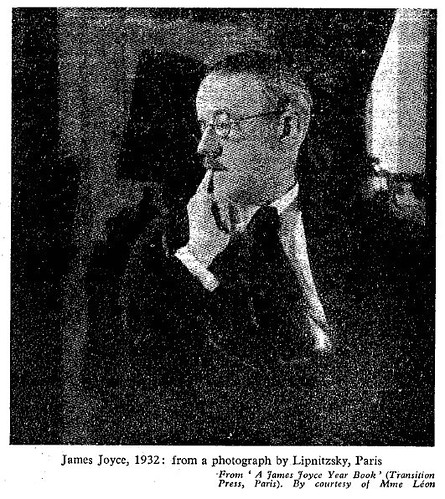At 10:30 pm on February 28, 1950, Henry Reed gave a fifteen-minute talk on the BBC Home Service, the eighth and final part of a series on "The English Novel." This talk, "James Joyce: The Triple Exile," was published in the next Listener, on March 9. Reed has condensed some ideas he first put forth in 1947, in a long essay for the journal Orion (I'll save that for another entry). Joyce, Reed says, has written from triple exile: exile from Dublin, from the Catholic church, and from 'the banishment of the heart.' This third being from one's family; exile from our parents, and eventually from our own children.
The talk touches on Joyce's Portrait of the Artist as a Young Man, and Reed calls Finnegan's Wake Joyce's greatest work, but he lingers a long time describing Ulysses' themes, style, and influence on the English novel:
You will find much Joyce, variously sophisticated, debased or vulgarised in the work of Aldous Huxley, Graham Greene, Henry Green, Elizabeth Bowen, Joyce Cary and countless others. They have never made good use of him; good use of him can possibly not be made. They have approached the great barrier, fecklessly snatched what they can and made off back. They have made off back to the past; they have not got over into the future. And so it is that in reading so many modern novelists you get the feeling of a pathetic retrogression and the inevitable afterthought that what they do has been better done already. Modern novelists—I can only speak of England—are desperately engaged in mopping-up operations; and they are often put to ill-considered stratagems in order to ginger a little originality or life into these operations: hence, I suppose, the crude religion so often draped along the top of modern fictions; hence the sadism and the dirty sexuality; hence also perhaps the curious ruse of writing about children; and, most alarming of all, the frank, crude, comprehensive ambitions of those novelists who avoid the analytical only to attempt the synthetic: who promise us a bastardisation of Kafka, or who threaten to do for our time what Dostoevsky or Balzac did for theirs.
The photograph of Joyce accompanying the article (above) is interesting—while my scan from the photocopy is terrible—because I cannot find a copy of it online. Which, of course, I had assumed would be easy enough. The caption states it is taken from the James Joyce Yearbook (Paris, 1949), and that it was taken circa 1932, by Boris Lipnitzki (1887-1971). There's another portrait of Joyce by Lipnitzki on the Joycean.org media page, but it's not this particular photo. I'll have to see if I can make a better copy. Update: Slightly better copy!








